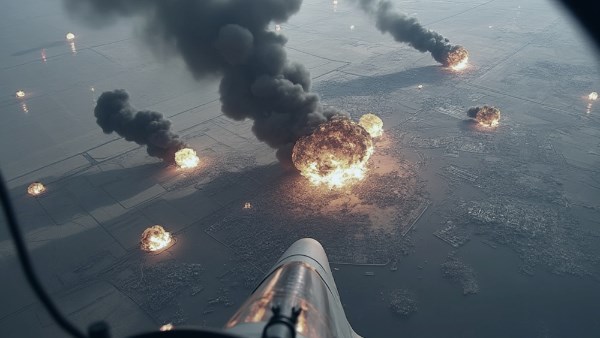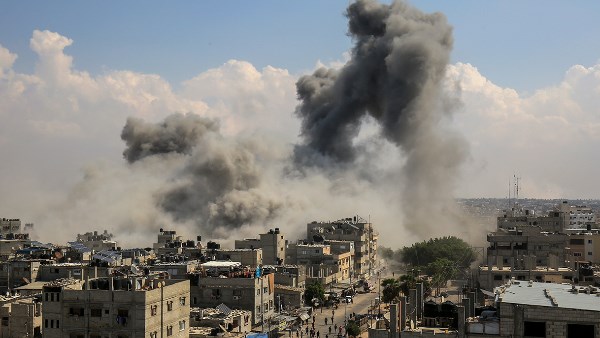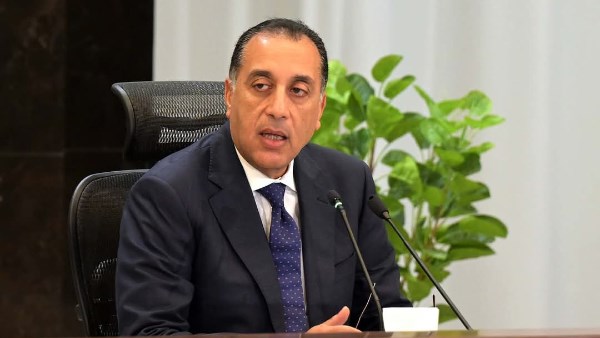
Some of the targets were anti-aircraft systems
Israel Boasts Strategic Gains From Attack on Iran, But Quietly

After sending more than 100 fighter planes to attack Iran, the Israeli government is seeking to walk a fine line: Officials there believe the attack did significant strategic damage but want to allow Iran to continue dismissing it as unworthy of response.
Orders went out to Israeli officials to stay mum on the details. Yet at a ceremony to mourn the losses from Hamas’ Oct. 7, 2023, invasion, Prime Minister Benjamin Netanyahu lauded the mission to Iran for “severely harming its defense capabilities and its ability to produce missiles that would be launched at us.”
The strike, he said, “was precise and powerful” and “achieved all its objectives.”
A readout of Israeli Defense Minister Yoav Gallant’s overnight phone call with US counterpart Lloyd Austin said they discussed “initial assessments regarding the success of the strikes against missile manufacturing facilities, surface-to-air missile arrays and Iranian aerial capabilities,” shedding more official light on targets.
Israeli officials, who spoke to Bloomberg on condition of anonymity to describe sensitive matters, gave more detail: They said some of the targets were anti-aircraft systems, including Russian-made S-300 batteries and some missile caches and missile-launch sites.
Setting the stage for another attack
Analysts say that the Saturday mission may set the stage for another attack, possibly after the US election, which could be aimed at Iran’s nuclear program or its oil infrastructure.
“The fact that the military was able to take down Iran’s anti-aircraft radar systems is a strategic change. By doing so, Israel has unlocked the door for future attacks. That means that Iran’s nuclear program and its energy infrastructure are more vulnerable to a to a future decision by Israel or the United States to attack them,” said Meir Javedanfar, an Iran lecturer at Reichman University in Herzliya.
At the same time, CIA Director William Burns is in Qatar with Mossad Chief David Barnea, leading the Israeli delegation, for new discussions over a cease-fire with Hamas in Gaza.
A former official in Israel’s intelligence services told Bloomberg that Iran is thought to have some 20 to 30 S-300 batteries. Even if only some were taken down – media reports circulated estimates of between four and eight batteries – it was a clear message that more could be damaged in future attacks. The S-300 system will be hard to replenish given Russia’s need to prioritize its own defenses in its war with Ukraine.
Eyal Pinko, a former Navy intelligence officer and missile expert, said that China has made its own version of the S-300 and is likely to provide it to Iran fairly soon.
Javedanfar said that even if Russia does have the capability to replace these systems, perhaps with even more advanced S-400 batteries, it will have to consider repercussions like a surge in US and Israeli weapons to Ukraine.
This feeds into the larger idea that Israel’s attack on Saturday, despite not displaying its full capabilities, could have far-reaching implications.
That includes the hit to Iran’s ballistic missile manufacturing capabilities, including a factory for mixing the elements of solid fuel for missile engines. The ex-intelligence official said that this is thought to be a major bottleneck in the production of missiles. The machinery can be replaced, mainly via China, but that would require time as it is an off-the-shelf product.
“It’s not clear what percentage of Iran’s capabilities have been hit in terms of producing missiles,” Javedanfar said. “But the fact that they have been hit sends a very important message to Iran about how the nerve center of its military production facilities are within the reach of Israel. If they had been taken out of action for one or two years it clearly says – we can hurt you.”
Alongside actual damage, analysts say that the scope of the operation was a strong signal in itself.
Flying over Iraq
It included a combination of more than 100 airplanes that were able to strike at a large distance from the Israeli border and come home safely, clear intelligence gathered by Israel and its allies and tight cooperation between Israel and the US, which was manifest in Israel’s ability to fly over Iraq, among other things.
This will also play a role in Iran’s decision how to respond, the ex intelligence official said.
Iran’s Supreme Leader Ali Khamenei said on Sunday that Israel’s attack shouldn’t be exaggerated or underestimated.
“The Zionist regime’s miscalculation must be disrupted,” Khamenei said in Tehran without elaborating. He added that Iran’s strength, determination and initiative “must be made clear to them.”









-32025522145948.jpg)
-320255125357264.jpg)













